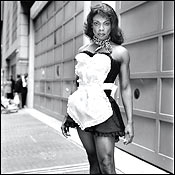
Jerry Herman’s La Cage aux Folles was, 21 years ago, a daring thing on Broadway. Yes, it had been a French play by Jean Poiret, whose movie version was seen in American art houses; but was the mass audience ready for a love story between two men? You may know the plot by now: For two decades Georges and Albin have lived together in Saint-Tropez, Georges running the Cage aux Folles nightclub, and Albin, as Zaza, its transvestite star. The chorines, the twelve Cagelles, are likewise men, although in the 1983 premiere two of them were women, challenging us to guess who was which. A tough proposition, given how attractive and persuasive the guys were. Against strong competition, the show swept that year’s Tonys.
With a good English book by Harvey Fierstein, ingratiating lyrics by Jerry Herman to his customarily seductive tunes, and savvy direction by Arthur Laurents, “What could have been seen as a polemic for gay rights,” observes Ken Bloom in Jerry Herman: The Lyrics, became “a universal story, a paean to individuality and the freedom of self-expression.” Or, as Ethan Mordden puts it in his book about the musicals of the last quarter-century, The Happiest Corpse I’ve Ever Seen, “The love that dare not speak its name doesn’t need to: there is only one kind of love.”
Certainly the romance of Georges’s son, Jean-Michel, who grew up in the Georges-Albin menage, and Anne, the daughter of a homophobic politician, takes a backseat. The climactic event is the dinner visit of the girl’s stuffy parents to the boy’s atypical household; the apartment has to be refurbished along arch-Catholic lines and Albin disguised as a proper mother. Truth to tell, the French film, and its much later American version, The Birdcage, are funnier than the musical. But they do not have that catchy score, Herman having become the archetypal Broadway composer, who, in Mordden’s words, “defines mainstream simply by showing up.”
This revival is a three-Jerry show; besides Herman, there is the director, Jerry Zaks, plus the choreographer, Jerry Mitchell. But the two latter Jerrys’ contribution is less unassailable. Mitchell has picked for the Cagelles dancers who are also acrobats, and, sure enough, the high kicks are heaven-storming and the cartwheels could loft a helicopter. But, as a result, the Cagelles (all twelve strictly male) are less distinguished for femininity and pulchritude, and some of the dances, though always inventive, are rather too much for a Saint-Tropez boîte. Nor is Zaks’s staging quite up to his resourceful best, and some touches, e.g., interplay with the conductor, repeatedly undercut the human values of the story in favor of slapstick.
Yet none of this means that the show, endearingly old-fashioned as it is, can be dismissed as jerry-built or, worse yet, geriatric. Scott Pask’s sets are, except for a hypertrophic moon, agreeably nostalgia-inducing; I liked one of the waterfront cafés’ being called Le Bateau Ivre. William Ivey Long’s costumes manage to be simultaneously outré and tasteful (a minor but estimable miracle), and Donald Holder’s lighting provides the necessary Mediterranean fairy-tale magic. The orchestra, under Patrick Vaccariello, couldn’t be more ear-filling, and performs Jim Tyler, Larry Blank, and David Krane’s orchestrations and dance arrangements with all-out brio.
Daniel Davis, an easefully elegant Georges, with a diction few American performers can match, projects character as securely as text. Gary Beach, so funny in a supporting role in The Producers, is not quite up to the demanding part of Albin, and seems at times to be cloning Nathan Lane. Though good in the quieter and most outrageous moments, he lacks in between. Gavin Creel is less than winning as Jean-Michel, and his ponytail seems to me out of place and period; even so, he fares better than Angela Gaylor as his girl Anne, who, in an admittedly underwritten part, comes across underfetching. As the gay, black butler, Jacob, Michael Benjamin Washington camps gleefully but should not lead with his teeth. As Anne’s father, the reactionary politician, Michael Mulheren is rather too American; as his wife, Linda Balgord is more Gallic. As a sassy restauratrice, Ruth Williamson is dependably Ruth Williamson. The others do what little is expected of them unexceptionably. “I Am What I Am” is the show’s hit song; this Cage may not be what it is ideally, but can Broadway, parched in a musical desert, insist on Perrier?

La Cage’s most poignant number, “I Am What I Am,” was adopted as an anthem of sorts at Washington, D.C.’s Gay and Lesbian Pride Day in 1984. Since then, it’s become a fight song for the gay-rights movement; for example, it was blared by the Lesbian & Gay Big Apple Corps marching band at the twentieth anniversary of Stonewall in 1989, just after then-mayor Ed Koch declared June Gay Pride Month. It’s also a gay-wedding staple, as Village Voice writer Richard Goldstein recently noted, writing about his ceremony: “I was a late-Beethoven kind of guy,” he says. “I never thought I would marry to the strains of ‘I Am What I Am.’ ”
La Cage aux Folles
Directed by
Jerry Zaks.
Marquis Theatre.